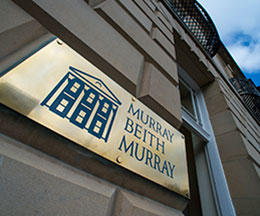Murray Beith Murray LLP is a leading Scottish private client law firm.
For 175 years we have specialised in meeting the legal, financial and administrative needs of individuals and families, family trusts, charities and private companies.
Murray Beith Murray LLP is a leading Scottish private client law firm.
For 175 years we have specialised in meeting the legal, financial and administrative needs of individuals and families, family trusts, charities and private companies.

If someone close to you has passed away, you may be concerned about money that has been left in their bank account. We understand that this may be a very stressful time for you and that additional financial or practical concerns may be causing you distress. In this article, we address money left in bank accounts after someone has passed away and the circumstances which mean you can access and withdraw such funds.
There are many reasons you may need to access money held in a bank account of a deceased person, and every circumstance is different. If you were dependent on the person who has passed away, you might need access to the bank account to pay basic bills or take care of the deceased’s estate liabilities. Whatever the reason, it is essential that you understand the law.
After a person has passed away, you cannot take money out of their bank account except in limited circumstances. It is important to notify the bank as soon as possible after a death. Continuing to use the deceased person’s bank account after the death is not legal. The bank will typically freeze the account when proof of death has been provided. If the account is held only in the deceased’s name, the bank will stop all direct debit payments and standing orders. Normally, they will send a record to the executor of what payments have stopped.
However, funds held in the deceased’s current account or savings account may be used to pay for:
If you held a joint bank account with the person who has passed away, you will still be able to access the account as normal. Unless you tell the bank which payments should stop, all direct debits and standing orders on the account will continue as normal.
For more information on what happens to a joint bank account when one party dies, see our article here.
If you were appointed as an attorney of the deceased person, you might have been able to access their bank account during their lifetime. However, Power of Attorney ends when the grantor dies, and so you no longer have the authority to carry out the same functions as you did in their lifetime.
It is the role of the executor to let the bank know that the person has passed away. In order to do so, you should follow the process set out by each bank. You will typically need a death certificate, and you may be required to complete some forms. While you cannot take money out of the account in the usual way, you can discuss with the bank the arrangements for paying funeral expenses or inheritance tax from the bank accounts of the deceased.
If you found this Insight blog useful, you may be interested in other articles by Murray Beith Murray which you can find here.
Murray Beith Murray deals with all aspects of executry administration and related tax matters and our Executry group has assisted many families with the legal issues arising following the death of a relative. If you have any questions about the issues covered here, or if you wish to discuss any other legal matter, then please complete our contact form or call us on 0131 225 1200.
At Murray Beith Murray, we're more than just lawyers - we're trusted advisors. We clearly outline the executry process, providing straightforward, practical advice and assistance. Our approach to client service is friendly and responsive, and we operate with the highest standards of integrity and professional expertise.
